- There are no more items in your cart
- Shipping Calculated at checkout
-
Sub-Total (inc. VAT)
£0.00
Need Help?
Metal Repairs
Specialist repair mortars and compounds for metal are essential for heavy industries where equipment and structures are exposed to extreme stress and environmental conditions. Designed for industrial applications, these high-performance materials repair various forms of damage like corrosion, cracks, and abrasion. Used in industries like construction, marine, and petrochemical, metal repair pastes prolong the life of critical assets. By offering advanced bonding, excellent resistance to chemicals and temperature, and durable repair solutions, these compounds prevent costly downtime and extend equipment longevity.
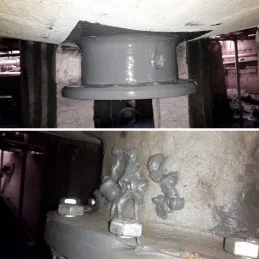
Resimac 101 Metal Repair Paste
Two-component, solvent-free epoxy repair paste for metal surfaces; available in mid-grey once mixed. Suitable for use on metallic substrates, including worn shafts, cracked engine blocks, and damaged casings. High build capability of up to 25mm without slumping. Fully machinable once cured for precision repairs. Offers excellent...
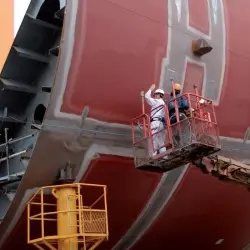
International Intergard 821
International Intergard 821 is a two component solvent free epoxy filler, which is easily mixed and applied by knife or trowel. Intended as a filler for correctly prepared, corroded and pitted steel prior to coating maintenance.
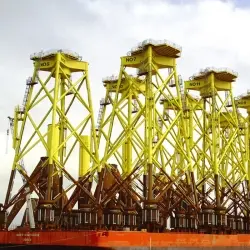
International Interzone 101
International Interzone 101 is a two component, solvent free epoxy which can be applied underwater to give a corrosion and abrasion resistant coating. Intended for use as a hand-applied repair compound for application to submerged steelwork and splashzone areas of offshore jackets, piling and other permanently wet areas where conventional...
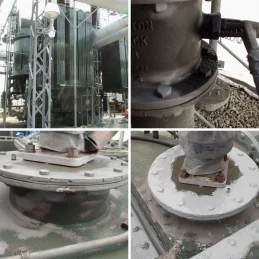
Resimac 104 Metal Repair Fluid XF
104 Metal Repair Fluid XF is a two component fast curing solvent free epoxy metal repair fluid. The product has been designed for use on a wide range of surfaces and is tolerant of less than ideal surface preparation and surfaces contaminated with grease, oil and lubricants. Suitable for emergency repairs to worn surfaces, as an anti-slip...
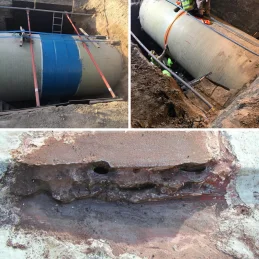
Resimac 106 Metal Repair Paste XF
106 Metal Repair Fluid XF is a fast curing two component solvent free epoxy metal repair compound. The product has been designed for use on a wide range of metallic surfaces, including underwater applications, and once cured is readily machineable. Typical applications include damaged pump shafts, cracked pump or valve casings, damaged...
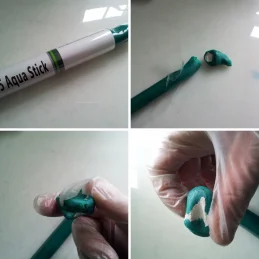
Resimac 105 Aqua Stick
Resimac 105 Aqua Stick is a two component repair material in stick form which cures underwater after mixing. It is a metal repair adhesive which develops high mechanical strength in a short period of time. Suitable for repairs to concrete and metallic surfaces underwater. For professional use only More Information Delivery Info
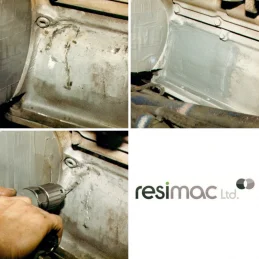
Resimac 103 Metal Repair Stick
Resimac 103 Metal Repair Stick is a two component repair material in stick form to seal or rebuild damaged surfaces, which cures rapidly at room temperature after mixing. It is a metal repair adhesive which develops high mechanical strength in a short period of time. Typical applications include cracked pump or valve casings, scored hydraulic...

Resimac 204 Heavy Duty Ceramic Repair Paste
Resimac 204 Heavy Duty Ceramic Repair Paste is a two component solvent free epoxy repair compound which contains 0.2mm – 1.5mm ceramic beads. The product is ideal for resurfacing and protecting metallic substrates subject to medium sliding abrasion. Typical applications include Pipe bends, Chutes, Hoppers, Valves, Pumps, Pipe surfaces. For...

Resimac 102 Metal Repair Fluid
Two-component epoxy repair fluid for resurfacing and protecting metal surfaces. Available in grey. Suitable for use on metallic substrates, including mechanically and abrasive blast-cleaned surfaces. Resists corrosion, abrasion, and chemical attacks; withstands thicknesses up to 3mm per application. Complies with USDA standards for...

Resimac 201 Ceramic Repair Paste
201 Ceramic Repair Paste is a two component solvent free epoxy repair compound containing hardened ceramic fillers designed to fill surface erosion & corrosion on metallic surfaces. Typical applications include worn impellers, damaged valves, separator housings, damaged pump casings, eroded pipe work, propeller, bow thrusters, rudders,...
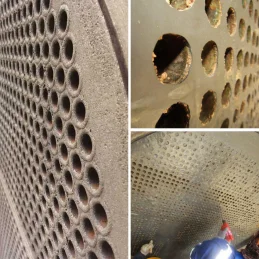
Resimac 202 Ceramic Repair Fluid
Resimac 202 Ceramic Repair Fluid is an erosion/ corrosion resistant for heavy abrasion environments. The product contains hardened ceramic fillers and is ideal for protecting metallic surfaces in aggressive fluid flow environments. Typical applications include worn impellers, damaged valves, separator housings, damaged pump casings, eroded...
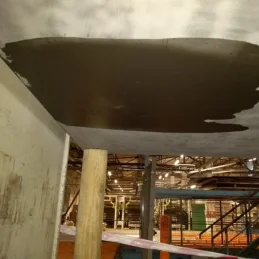
Resimac 107 Metal Repair Paste XL
107 Metal Repair Paste XL is a two component solvent free epoxy metal repair compound. The product has an extended usable life for applications in warmer climates and has been designed for use on a wide range of metallic surfaces and once cured is readily machinable. Suitable for emergency repairs or part of planned maintenance to equipment...

Resimac 204 UHD Paste
204 UHD Paste is a two component solvent free epoxy repair compound containing ceramic beads for extreme impact & sliding abrasion environments from aggregates & wet slurries. Typical applications include Slurry pumps, Bins & hoppers, Fan blades & housings, Internal pipe surfaces, Wear plates, Pipe elbows, Chutes Transport...
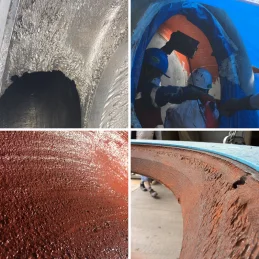
Resimac 204 XHT Paste
204 XHT Paste is a two component solvent free epoxy novolac repair compound containing ceramic beads for extreme wear environments from fine particles & wet slurries. Once cured the repair materials can withstand immersion temperatures up to 130°C & dry temperatures up to 240°C. Typical applications include Slurry pumps, Bins &...

Resimac Resimetal 204 HD Paste
Resimetal 204 HD Paste is a two component solvent free epoxy repair compound containing ceramic beads for extreme wear environments from fine particles & wet slurries. Typical applications include Slurry pumps, Bins & hoppers, Fan blades & housings, Internal pipe surfaces, Wear plates, Pipe elbows, Chutes, Transport screws. For...
Need Help?
Need Help?
Specialist repair mortars and compounds for metal are vital tools in maintaining the operational integrity of metal structures and machinery in a wide range of industries. These products are designed to repair everything from small cracks to severe corrosion and wear in metal surfaces that would otherwise lead to equipment failure, inefficiencies, or hazardous situations. From construction machinery, pipelines, and industrial boilers to marine vessels and offshore rigs, metal repair pastes are used across the globe to ensure that key metal components continue to function under extreme conditions.
Industries and Market Sectors
The demand for high-quality metal repair compounds spans multiple industries where metal is the primary material in use. In the oil and gas sector, for instance, pipelines, storage tanks, and offshore structures are constantly subjected to chemical exposure, pressure, and harsh environmental conditions. Repairing these assets is crucial to avoiding leaks and catastrophic failures. Manufacturing facilities, where heavy machinery experiences continuous wear and tear, also benefit from the use of metal repair compounds to prevent operational disruptions caused by mechanical failures.
Another significant sector is power generation, where metal components in turbines, boilers, and cooling systems face high temperatures and corrosive environments. The ability to make quick, effective repairs using metal repair pastes can prevent costly outages. Similarly, in the mining industry, equipment such as conveyor belts, crushers, and loaders are subjected to abrasive materials that wear down metal surfaces. In these conditions, metal repair pastes provide durable protection against ongoing damage.
In marine and offshore applications, metal repair mortars are essential for ships, oil rigs, and underwater pipelines exposed to saltwater corrosion. Without timely intervention using these specialist compounds, structural degradation can lead to serious safety hazards. Even in automotive and transportation sectors, repair mortars are crucial in maintaining the performance and safety of vehicles, including those used in public transport and logistics.
Typical Types of Damage
- Corrosion: One of the most common types of damage repaired using metal repair compounds is corrosion. Corrosion occurs when metals like steel or iron react with oxygen, water, and chemicals, leading to rusting or degradation of the material. In pipelines, storage tanks, or marine vessels, unchecked corrosion can compromise the structure’s strength, causing leaks or failures. Metal repair pastes formulated to bond with corroded surfaces effectively halt further damage, offering a protective barrier that stops the spread of rust and reinforces the weakened metal.
- Cracks and Fractures: Cracks can develop in metal surfaces due to stress, impact, or continuous load-bearing in sectors like construction, mining, or power generation. If not addressed, these cracks can spread, significantly weakening the equipment or structure. Metal repair compounds designed to fill and bond cracks ensure that the affected area regains its mechanical integrity. For example, cracks in large industrial machinery gears or shafts can be filled with repair pastes that prevent equipment breakdowns.
- Pitting and Surface Abrasion: Metal components in industries like manufacturing or mining often suffer from surface abrasion caused by friction or the abrasive materials they handle. Pitting—small, localised holes in the metal—can occur due to corrosion or mechanical wear. Repair mortars for metal surfaces can fill in these pits and create a smooth, durable finish that is resistant to further wear.
- Impact Damage: Metal structures and equipment in high-impact environments, such as those found in the construction and mining sectors, often experience dents, gouges, or other forms of impact damage. Metal repair compounds can effectively fill in and restore these areas, preventing the formation of cracks or further deterioration.
- Chemical Attack: In environments such as chemical processing plants, refineries, or food and beverage industries, metals are frequently exposed to aggressive chemicals that erode the surface. Metal repair pastes offer chemical resistance and restore the affected areas while providing protection against future chemical exposure.
Common Applications of Metal Repair Compounds
Heavy Machinery Repairs in Industrial Settings
In heavy industries such as manufacturing, mining, and construction, machinery is often subject to intense wear, friction, and load-bearing. Over time, metal components like gears, pumps, housings, and shafts can become damaged due to the constant operational stress. Metal repair pastes play a key role in restoring these parts, enabling businesses to avoid the significant costs and delays associated with full component replacement.
For example, in a manufacturing facility, the gearboxes that drive conveyor belts may suffer from wear, particularly where metal components are in constant contact. When wear occurs on the teeth of a gear, a metal repair paste can be applied to build up the worn area, then machined back to the original dimensions. This not only restores the part but also ensures that the equipment can continue operating without interruption. Similarly, cracked pump casings can be repaired using high-strength metal repair compounds, eliminating the need for expensive downtime or new parts.
Pipeline and Tank Repairs in the Oil and Gas Industry
The oil and gas sector often deals with metal structures such as pipelines, storage tanks, and pressure vessels that are exposed to harsh chemicals, high pressure, and fluctuating temperatures. Over time, corrosion, cracks, and leaks can develop, posing serious environmental and operational risks. Metal repair pastes are essential for patching leaks, sealing cracks, and reinforcing weakened areas, allowing these structures to remain operational without requiring complete replacements.
For instance, pipelines transporting crude oil or natural gas are prone to internal corrosion due to the abrasive and sometimes acidic nature of the substances being transported. Applying a corrosion-resistant metal repair paste over the affected areas can stop further deterioration and restore the pipeline's integrity. In some cases, these compounds can be applied underwater or in environments where shutting down the pipeline for extensive repair is not an option, offering a highly efficient and cost-effective solution.
Storage tanks, which hold everything from chemicals to petroleum products, are another example of structures that can benefit from metal repair pastes. Corrosion or stress cracks often develop around seams or welds. By using repair mortars, these tanks can be effectively sealed without the need for draining or replacing large sections, minimising downtime and operational disruption.
Heat Exchanger and Boiler Maintenance in Power Plants
Power plants rely on equipment like boilers and heat exchangers, which are constantly exposed to extreme temperatures and pressure variations. Over time, this exposure can lead to cracks, leaks, or erosion of metal components. Replacing large boilers or heat exchangers can be prohibitively expensive, making metal repair pastes an attractive alternative. These products are designed to handle high-temperature environments, making them ideal for restoring the structural integrity of metal components exposed to extreme heat.
In the case of a heat exchanger, the tubes through which fluids pass can erode over time due to high fluid velocity and chemical exposure. Repair compounds are applied to reinforce the weakened areas, allowing the heat exchanger to function efficiently once more. Similarly, in boilers, cracks that form in high-stress areas can be filled with heat-resistant metal repair mortars, preventing the need for complete replacement and ensuring that the system can return to full operation quickly.
Ship Hull and Marine Structure Restoration
The marine industry presents some of the toughest challenges for metal equipment and structures. Ships, oil rigs, and other marine installations are constantly exposed to saltwater, which accelerates the corrosion of metal surfaces. Over time, this corrosion can weaken hulls, propellers, and other critical components, leading to leaks, structural failures, and safety risks.
Metal repair compounds designed specifically for marine applications are formulated to bond effectively with surfaces that are either wet or submerged. For example, a ship's hull suffering from rust and corrosion can be patched using a marine-grade metal repair paste. This allows ship owners to avoid costly dry-docking, as repairs can be carried out while the vessel is still afloat. In offshore oil platforms, similar products are used to repair cracks or corrosion in underwater pipelines and structural supports, ensuring continued operation without the need for expensive replacement parts.
Marine vessels also face significant wear and tear from propeller damage. When propeller blades are nicked or damaged by debris, a repair paste can be applied to rebuild the affected area, restoring the propeller’s performance without needing to replace the entire blade. Metal repair pastes also protect submerged parts from further corrosion, extending the lifespan of marine equipment.
Infrastructure and Structural Metal Repairs in Construction
Metal components in construction projects, such as steel beams, girders, and structural supports, face constant stress and exposure to the elements. Over time, environmental factors like rain, humidity, and pollution can lead to corrosion, while constant load-bearing may result in cracks or weakening of these critical metal components. Instead of costly demolition or replacement, metal repair compounds can be used to restore structural integrity and extend the life of metal infrastructure.
For example, in bridge construction, metal beams may begin to corrode due to prolonged exposure to moisture. Applying a corrosion-resistant metal repair paste to affected areas halts further deterioration and strengthens the metal, preventing structural failure. Similarly, load-bearing columns in buildings can develop cracks over time. Rather than replacing these columns, repair compounds can fill and seal the cracks, restoring the metal's load-bearing capacity without the need for extensive reconstruction.
Metal repair mortars are also used in public infrastructure such as guardrails, signposts, and fences, where regular exposure to weather can lead to rusting and degradation. By applying repair pastes to these areas, businesses and municipalities can extend the life of their infrastructure without incurring the high costs of replacement.
Repair of High-Temperature Components in Industrial Furnaces
Industrial furnaces used in the metallurgical, ceramic, and glass industries operate at extreme temperatures that can cause metal components to crack, warp, or erode over time. Replacing these furnace components is often not feasible due to the high costs and the complexity of the equipment. Instead, high-temperature-resistant metal repair pastes offer an effective solution.
For instance, furnace linings, which are constantly exposed to molten materials and high heat, can develop cracks that compromise the overall efficiency and safety of the furnace. A specialised metal repair paste can be applied to these cracks to restore the lining’s structural integrity, enabling the furnace to continue operating safely. Similar repairs are made to refractory bricks, which form the internal walls of furnaces, preventing the need for total replacement.
Food and Beverage Industry Equipment Maintenance
Metal repair compounds are also widely used in the food and beverage industry, where equipment like tanks, conveyor systems, and processing machines are subject to both wear and chemical exposure. The food processing environment often involves exposure to water, cleaning agents, and sometimes acidic food products, which can accelerate the corrosion and wear of metal components.
In this sector, the use of food-safe metal repair pastes is crucial for addressing damage while maintaining hygiene standards. For example, a stainless steel conveyor belt in a beverage production facility may develop small cracks due to constant use and exposure to acidic liquids. A metal repair paste designed for food industry applications can fill the cracks, preventing further damage and ensuring that the equipment remains safe for processing consumables.
Automotive and Transportation Industry Repairs
Vehicles, whether for personal, commercial, or public transport use, often experience wear on metal components such as engines, transmissions, and body frames. Replacing these parts is expensive, and in many cases, unnecessary if damage is detected early. Metal repair pastes are frequently used in the automotive industry to repair engine blocks, transmission housings, and exhaust systems, providing a quick, reliable, and cost-effective solution.
For instance, a cracked engine block might typically require an engine replacement, but with the application of a metal repair paste, the crack can be sealed, allowing the engine to continue operating at full capacity. Similarly, rust damage to vehicle frames or exhaust systems can be treated using corrosion-resistant metal repair compounds, preventing further decay and extending the life of the vehicle.
Top Features to Consider When Choosing Metal Repairs
When selecting a metal repair compound, it's important to consider its performance under different conditions. Bonding strength and chemical resistance are two of the most critical features, especially for applications in sectors like oil and gas or chemical processing, where the repaired metal surfaces are regularly exposed to corrosive environments. High-quality repair mortars not only bond effectively with various metal surfaces like steel, iron, or aluminium but also offer excellent chemical and temperature resistance. This ensures the durability of the repair, even in challenging conditions.
Temperature and wear resistance are equally important when choosing the right repair paste for industries such as power generation or mining, where metal components may face extreme heat and constant friction. Metal repair pastes designed to withstand these stresses ensure long-term durability, reducing the need for frequent reapplication and protecting key components from further damage. Ease of application is also a critical factor, as many industrial repairs need to be carried out quickly to minimise downtime.
FAQs
- Can metal repair pastes be used on pressurised equipment?
Yes, many metal repair compounds are suitable for use on pressurised equipment like pipelines or pressure vessels. These pastes are engineered to bond strongly and provide a durable seal, preventing leaks and maintaining pressure integrity. - How long does a typical repair last?
With proper surface preparation and correct application, metal repair pastes can last for years, often providing a repair that matches the durability of the original metal. The longevity depends on the conditions to which the repaired metal is exposed, such as temperature, pressure, and chemical exposure. - Are metal repair pastes resistant to both heat and cold?
Yes, many repair pastes are formulated to resist extreme temperatures, including both high heat and sub-zero conditions. This makes them suitable for applications in environments such as power generation plants and refrigeration units. - Can metal repair pastes be applied to moving parts?
While metal repair pastes are effective on stationary components, using them on moving parts is less common. However, some products can be applied to low-speed components, such as worn gears or bearings, as long as the repaired area is properly reinforced. - Can metal repair compounds be used in underwater applications?
Yes, certain metal repair pastes are specially formulated for use in damp environments or even fully submerged conditions, making them ideal for marine and offshore repairs. - Do these repair compounds require curing?
Yes, metal repair pastes typically require a curing period before the repaired part can be returned to full service. This can range from a few hours to a full day, depending on the specific product and environmental conditions. - Are metal repair compounds environmentally friendly?
While some metal repair products may contain solvents or chemicals, many are formulated to be environmentally safe and low in VOCs (volatile organic compounds). Always check the product data sheets for environmental compliance. - Can metal repair compounds be used on non-metal surfaces?
Some repair pastes are versatile enough to bond with other materials like ceramics or composites, although they are primarily designed for use on metal surfaces.
